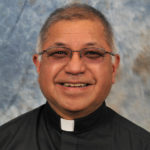
During a virtual Lunch and Learn presentation on Sept. 2, Amy Kersten, right, a volunteer with the diocesan Social Action Office, shares a photo of Bishop Thomas Zinkula praying with an immigrant.
By Lindsay Steele
The Catholic Messenger
Bishop Thomas Zinkula has become known for his work reaching out to the peripheries, whether spending time with people at free meal sites, praying with immigrants, visiting inmates or working with children in India.
“This is not meant to be a look at me and everything I’ve done and been involved in” kind of thing, he told virtual participants of the diocesan Social Action Office’s monthly Lunch and Learn Sept. 2. The webinar focused on the bishop’s work with marginalized individuals. “Basically, we bloom where we’re planted. I’ve been to different places along the way, and there have been different opportunities to get involved with social justice.”
If anything, he wants to show his flock that they, too, can find opportunities to serve the marginalized in their communities.
He offered examples of ways he has gotten involved over the years. While in seminary at Catholic University of America in Washington, D.C., he worked alongside the Missionaries of Charity tending to poor and dying individuals. Many of them were people of color suffering from AIDS. His main objective was simply to be present and offer a listening ear. “I needed to get out of my comfort zone,” he said. By getting to know these individuals, the bishop was able to work through some of the “implicit biases” he had. “We can easily demonize the stranger.”
In another community, he spent time with young fathers who wanted to become better role models for their children. “Most of their children lived with the moms, but (the fathers) wanted to be involved in their children’s lives,” the bishop recalled.
As a priest and now a bishop, he looks for local opportunities to reach out, understanding that his role as a cleric can draw needed attention to important issues. As a priest of the Archdiocese of Dubuque, he ministered to inmates at the Anamosa State Penitentiary, not far from his hometown of Mount Vernon. “It was scary at first, going through all the gates and locks, but eventually I knew (the people there) and they knew me.” Before the COVID-19 pandemic, which limited visitation at correctional facilities, he ministered to inmates and celebrated Mass at the four facilities in the Diocese of Davenport.
While he can’t do “everything,” he does his best to participate in prayer vigils and other outreach events to which he is invited.
He hopes that, by sharing his experiences, he can spark the imagination of his flock, helping them to recognize service and accompaniment opportunities in their communities. “What are the needs around you? What are the things you’re seeing? Who are the people on the peripheries? What are your interests and gifts? What is God calling you to do?” he asked the virtual audience at the Lunch and Learn.
He encourages the faithful to consider their own interests and find an area of focus. It could be helping with funerals, starting a grief support group, planning or attending prayer vigils outside abortion clinics, helping pregnant mothers, advocating for systemic change, donating to or helping out at food pantries, working with underprivileged children, accompanying immigrants and working with families who are struggling.
He said helping the marginalized can be as simple as living frugally and making donations to organizations that help those most in need. Reaching out to homebound or sick individuals in one’s faith community is another way to serve.
He noted that serving the marginalized helps the church as well as the people served. While young people are leaving the church in record numbers, service projects “pull them into the church” and offer opportunities to connect service with hope, faith and charity.
“There are opportunities in every community” to reach out,











